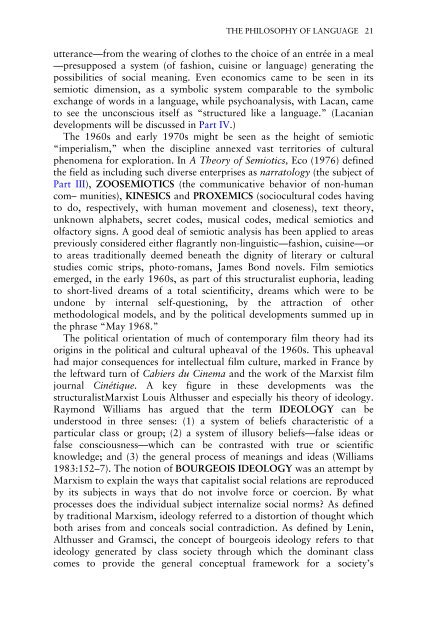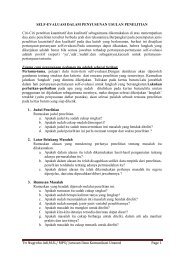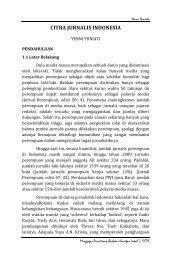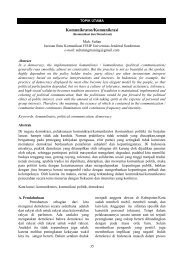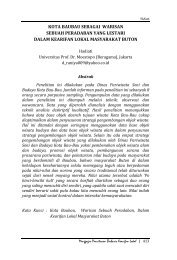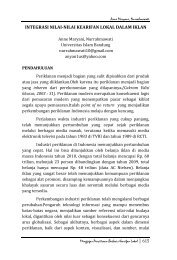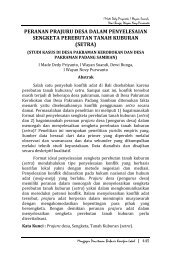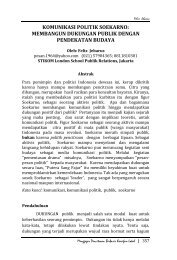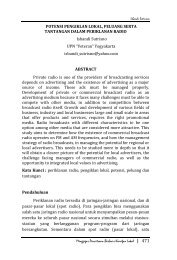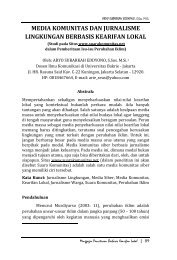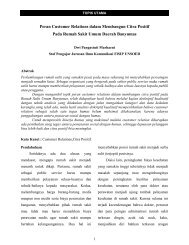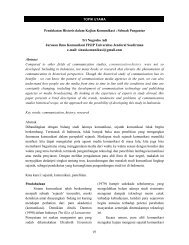New Vocabularies in Film Semiotics
New Vocabularies in Film Semiotics
New Vocabularies in Film Semiotics
Create successful ePaper yourself
Turn your PDF publications into a flip-book with our unique Google optimized e-Paper software.
THE PHILOSOPHY OF LANGUAGE 21<br />
utterance—from the wear<strong>in</strong>g of clothes to the choice of an entrée <strong>in</strong> a meal<br />
—presupposed a system (of fashion, cuis<strong>in</strong>e or language) generat<strong>in</strong>g the<br />
possibilities of social mean<strong>in</strong>g. Even economics came to be seen <strong>in</strong> its<br />
semiotic dimension, as a symbolic system comparable to the symbolic<br />
exchange of words <strong>in</strong> a language, while psychoanalysis, with Lacan, came<br />
to see the unconscious itself as “structured like a language.” (Lacanian<br />
developments will be discussed <strong>in</strong> Part IV.)<br />
The 1960s and early 1970s might be seen as the height of semiotic<br />
“imperialism,” when the discipl<strong>in</strong>e annexed vast territories of cultural<br />
phenomena for exploration. In A Theory of <strong>Semiotics</strong>, Eco (1976) def<strong>in</strong>ed<br />
the field as <strong>in</strong>clud<strong>in</strong>g such diverse enterprises as narratology (the subject of<br />
Part III), ZOOSEMIOTICS (the communicative behavior of non-human<br />
com– munities), KINESICS and PROXEMICS (sociocultural codes hav<strong>in</strong>g<br />
to do, respectively, with human movement and closeness), text theory,<br />
unknown alphabets, secret codes, musical codes, medical semiotics and<br />
olfactory signs. A good deal of semiotic analysis has been applied to areas<br />
previously considered either flagrantly non-l<strong>in</strong>guistic—fashion, cuis<strong>in</strong>e—or<br />
to areas traditionally deemed beneath the dignity of literary or cultural<br />
studies comic strips, photo-romans, James Bond novels. <strong>Film</strong> semiotics<br />
emerged, <strong>in</strong> the early 1960s, as part of this structuralist euphoria, lead<strong>in</strong>g<br />
to short-lived dreams of a total scientificity, dreams which were to be<br />
undone by <strong>in</strong>ternal self-question<strong>in</strong>g, by the attraction of other<br />
methodological models, and by the political developments summed up <strong>in</strong><br />
the phrase “May 1968.”<br />
The political orientation of much of contemporary film theory had its<br />
orig<strong>in</strong>s <strong>in</strong> the political and cultural upheaval of the 1960s. This upheaval<br />
had major consequences for <strong>in</strong>tellectual film culture, marked <strong>in</strong> France by<br />
the leftward turn of Cahiers du C<strong>in</strong>ema and the work of the Marxist film<br />
journal C<strong>in</strong>étique. A key figure <strong>in</strong> these developments was the<br />
structuralistMarxist Louis Althusser and especially his theory of ideology.<br />
Raymond Williams has argued that the term IDEOLOGY can be<br />
understood <strong>in</strong> three senses: (1) a system of beliefs characteristic of a<br />
particular class or group; (2) a system of illusory beliefs—false ideas or<br />
false consciousness—which can be contrasted with true or scientific<br />
knowledge; and (3) the general process of mean<strong>in</strong>gs and ideas (Williams<br />
1983:152–7). The notion of BOURGEOIS IDEOLOGY was an attempt by<br />
Marxism to expla<strong>in</strong> the ways that capitalist social relations are reproduced<br />
by its subjects <strong>in</strong> ways that do not <strong>in</strong>volve force or coercion. By what<br />
processes does the <strong>in</strong>dividual subject <strong>in</strong>ternalize social norms? As def<strong>in</strong>ed<br />
by traditional Marxism, ideology referred to a distortion of thought which<br />
both arises from and conceals social contradiction. As def<strong>in</strong>ed by Len<strong>in</strong>,<br />
Althusser and Gramsci, the concept of bourgeois ideology refers to that<br />
ideology generated by class society through which the dom<strong>in</strong>ant class<br />
comes to provide the general conceptual framework for a society’s


